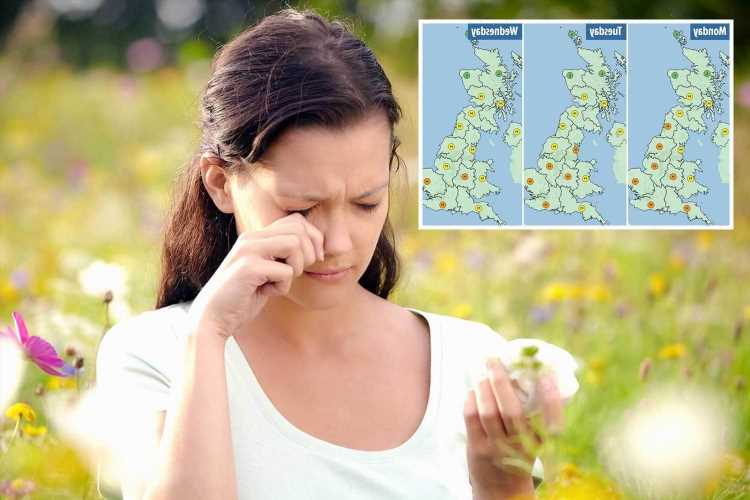MILLIONS of hay fever suffering Brits are set for misery this week as storms and downpours spark a pollen bomb.
Across the country there will be high levels of tree pollen circulating – especially in the South.
Around one in four people in the UK suffer from hay fever – that equates to around 16 million people.
Over the next few days most of the UK is set to be hit by rain and the Met Office today reminded Brits that it's not just warm temperatures that can cause pollen levels to soar.
It today said that pollen levels can be high even after rain, adding: "During a thunderstorm¸ high humidity can split pollen grains, releasing a higher density of pollen into the surrounding air."
The experts said: "Any rainfall causes a marked decrease in pollen concentration in the air, but the time and amount that it rains during the day is very important.
"Early, heavy and prolonged rain is likely to keep counts low all day whereas rain in the afternoon will have less of an impact."
Today pollen levels will be high across the South and up to Yorkshire and the Humber.
Wales, the North West and some parts of Scotland will have medium pollen levels, with the Highlands having low levels.
In the East of England the high pollen count is expected to continue until at least Thursday.
In London and the South East this could even push through to the weekend, so make sure you're got your antihistamines at hand if you're planning any outdoor activities this weekend.
In the North West however, pollen levels will fall as the week progresses.
Brits yesterday basked in a 20C mini-heatwave – but this week will see torrential downpours and possible flooding.
The Met Office's outlook for Monday to Wednesday says: "Generally unsettled with a mixture of sunny spells and showers, as well as some more prolonged periods of rain.
"Some heavy bursts likely at times with a risk of thunderstorms."
Top tips on quelling hay fever symptoms
As a pollen bomb is set to hit this week it’s important to be prepared.
Specsavers clinical services director, Giles Edmonds reveals his top tips for keeping on top of your symptoms.
- Put Vaseline around your nose to trap pollen.
- Shower and change your clothes after being outside.
- Stay inside and close windows when pollen counts are high.
- Don’t rub your eyes or touch your face and make sure hands are kept clean.
- Try eye drops to help ease itching.
- Wear a face mask when outside to lower the rate of inhalation of pollen, spores and dust.
The Met Office's long range forecast from May 13 to May 22 says: "Cloudy on Thursday starting with outbreaks of rain and showers, especially in the southwest of the UK.
"Showers are expected to become more widespread during the day, with these heavy and potentially thundery for the south. The breeziest conditions expected in the far northwest.
"Remaining showery for the rest of the week with the chance of a brief settled spell from the west into Friday."
It's key to remember though that even if you're not outside, your allergies could still flare up.
Many people are still working from home due to the coronavirus pandemic and experts have said that allergens can still creep into the home.
Airborne allergens such as pollen, dust and pet particles can all circulate and while our air-conditioned offices would filter this out, our homes don't.
Airborne allergens expert, Max Wiseberg said avoiding the allergen is always key with any allergy, whatever it might be.
He said: "Keep windows and doors closed to prevent pollen blowing in. Instead, use an air conditioner, preferably with a HEPA (High Efficiency Particle Arresting) filter to capture the pollen particles, to cool and circulate the air.
“Vacuum the house regularly, especially beds and fabrics to remove pollen, dust and pet allergens. Wash bedding very regularly to remove allergens. Damp dust surfaces so that allergens are not redistributed into the air.”
“Store cuddly toys in a cupboard to prevent pollen, pet and dust particles settling on them.”
Source: Read Full Article







